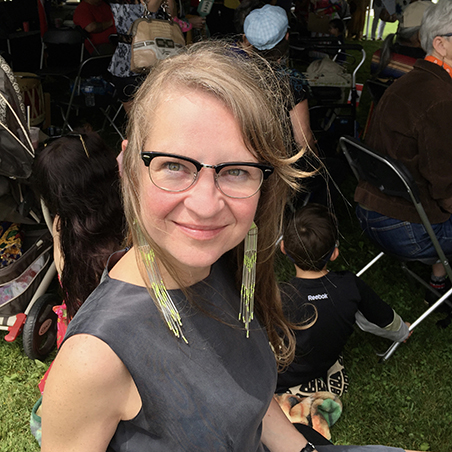Angel Moore
Atlantic Correspondent for Aboriginal People’s Television Network
Bachelor of Journalism, 2018
I am trying to change perception through story telling.
It was the day before Encaenia 2018 and Angel Moore had a job interview. She had applied to the Aboriginal People’s Television Network (APTN) for a summer internship. But after meeting with management at the network she was advised to apply for a full-time reporter position as APTN’s Atlantic correspondent. Angel worried she might be in over her head, so she was brutally frank during the interview.
“I said, just so you know, I have just graduated from Journalism School, I am older than the other students, I haven’t been the editor of my school newspaper. I’m indigenous but I don’t look it, I’m blonde!”
Twenty-four hours later Angel had her degree in hand and a job in journalism.
“I tried to be cool,” she says when they called with the offer. “But then I just cried.”
Angel grew up in Winnipeg. Her mom wanted more for Angel, a better education, a better life. The rest of the family lived in Peguis First Nation, where Angel loved spending summers with her grandmother, aunties, and cousins.
“My grandmother and I were very close. That’s where my drive comes from.”
It is a powerful drive. Angel worked as a server and bartender before going back to school. She studied chemistry and psychology at the University of Manitoba. She began to think about social issues affecting indigenous people.
“I have family members who have suffered poverty and homelessness and the other tragedies,” Angel says.
She then went to Dalhousie to study international development and sustainability because, as she explains, “International development issues could apply to issues on indigenous communities.”
“It’s the same thing. There are issues such as exploitation, racism, environmental racism.”
After graduating from Dalhousie, Angel studied journalism at King’s. She knew she was a good writer and a good communicator.
“I tried to have my experience at King’s as diverse as possible,” Angel says. “That’s the way I live—to have diverse experiences and learn as much as I can from each one. I wanted to learn as much about journalism as I could.”
She took courses in radio and TV, magazine and digital media. A professor suggested she apply for the summer internship with APTN, but instead, she ended up getting hired full time.
APTN is unique. It airs news programs and other shows for, by and about indigenous people in Canada and the United States. It launched in 1992 and has had a national broadcast license since 1999. APTN hires indigenous reporters and staff, even blonde ones such as Angel.
“APTN is telling indigenous stories for indigenous people. It is empowerment,” Angel explains. But she says ending up at that network was more fate than planning.
“My mission isn’t to empower other indigenous people. That’s just happening. My mission is to tell their stories as truthfully and honestly as possible from their perspective.” Angel continues. “I am trying to change perception through story telling. And I want to give people, who haven’t had a voice before, the chance to speak.”
Posted November 2018
 Connect with Angel Moore
Connect with Angel Moore